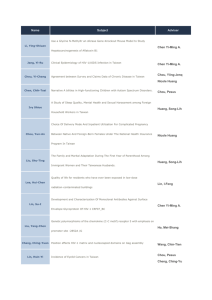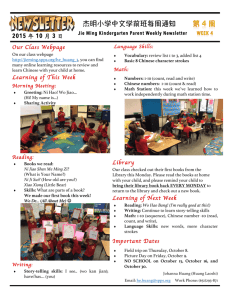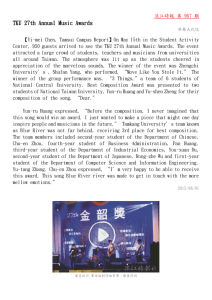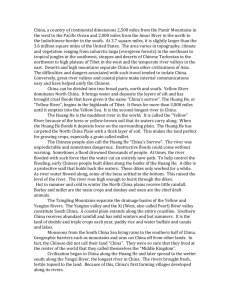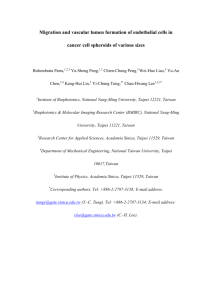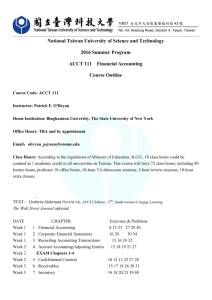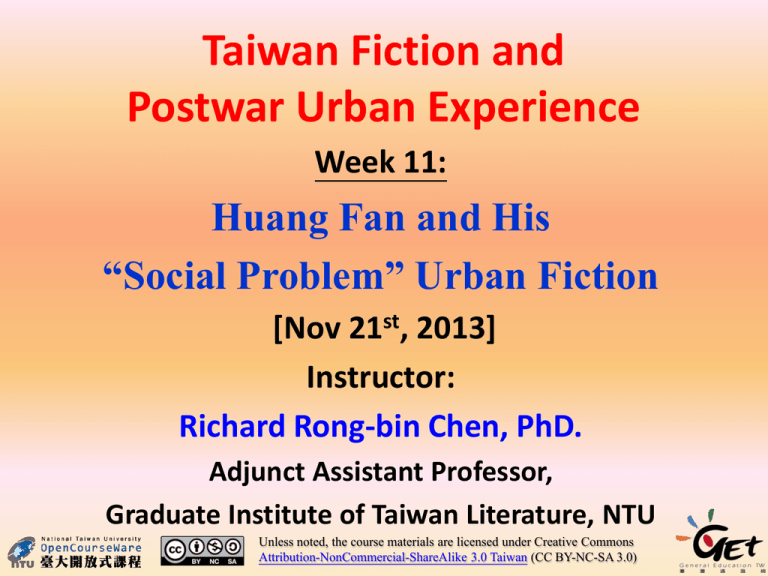
Taiwan Fiction and
Postwar Urban Experience
Week 11:
Huang Fan and His
“Social Problem” Urban Fiction
[Nov 21st, 2013]
Instructor:
Richard Rong-bin Chen, PhD.
Adjunct Assistant Professor,
Graduate Institute of Taiwan Literature, NTU
Unless noted, the course materials are licensed under Creative Commons
Attribution-NonCommercial-ShareAlike 3.0 Taiwan (CC BY-NC-SA 3.0)
Huang Fan on His Urban Writing
• I have to write “a new
breed of Chinese
characters” which are
completely different
from those in Taipei
People. (Toushih
shenghuo [都市生活],
1987. p. 7)
This work is licensed by 張耀仁 for the use of “Course
Database of General Education TW” ONLY. The copyright
belongs to the above mentioned creator and we do not have
the authorization right.
Huang Fan, Penname of Huang Hsiao-chung
• 1950: born in Taipei. He is a graduate of Chung
Yuan College of Science and Engineering
[中原理工學院].
• In 1979, with “Lai Suo” [賴索] , his first piece
of fiction, he won the United Daily News fiction
competition.
• “Lai Suo” is a short story with the theme of
politics set in the 1970s, a period which was both
confusing and exciting for many Taiwanese. (Lai
Suo is a marginal and naïve figure in Taiwan’s
“Independence Movement.”)
• The next year, Huang won the same competition
for the second time with “Rainy Night” [雨夜]
(1980).
• Though among Huang’s first pieces of fiction,
“Everybody Needs Ch’in Te-fu” [人人需要秦
德夫] had been rejected for about two years
before it was finally published in Hsientai
wenhsueh [Modern Literature], the journal
founded by Pai Hsien-yung, in 1980, a year later
than “Lai Suo.”
• “Everybody Needs Ch’in Te-fu”: Huang’s
version of The Great Gatsby.
“Urban Fiction” and “Postmodern Fiction”
• In the 1980s, Huang Fan developed himself into
a pioneer in both the spheres of “Urban Fiction”
and “Postmodern Fiction.”
• In the former category, his representative works
are City Life [都市生活] (1987) and Tycoon [財
閥] (1988).
• In 1985, he published “How to Measure the
Width of a Ditch” [如何測量水溝的寬度]
(1985), arguably the first postmodern work of
fiction in Taiwan.
The Rise of Urban Literature
• Made possible by economic prosperity since the
1970s.
• Made possible by the writers’ urban life
experience. (For example, lifestyle of apartment
dwelling.)
• Political freedom.
• City is not only a setting, but also a socialized
and institutionalized space.
• Social problems: chaotic life, class oppression,
urban development, social alienation, etc.
• Postmodern stories or novels do not try to
tell story or to make sense because they are
mainly about exploring the possibilities of
storytelling: that is, how stories can be told
and how a plot can be manipulated in order
to make readers reflect upon the nature of
fiction as a genre.
• So the story is not mainly about the event of
measuring the width of a ditch, but how to
narrate such meaningless a story.
”A History of Condo Sales”
[房地產銷售史] (1987)
• Buffet-style Construction Project
• Characters
• A Single/A housewife/A man with
two wives
• A Feng-shui practitioner
• A fashion designer
• A private detective
• A lottery winner
The Urban Problems:
Freeways
“Freeways are absolutely the murderers
of traditional communities. The towns
that freeways cut through have been
completely bled of their unique
cultures.”
From Huang Fan, "A History of Condo Sales," translated by Kevin T.S. Tang.
Published in Words without Borders April 2010. Translation copyright 2010 by Kevin
T.S. Tang. By permission of the publisher. All rights reserved.
The Urban Problems:
Sameness in the City
• “Isn’t that right? Just to accommodate
those freeways, everyone’s been
building the same cookie-cutter houses,
building higher fences. Grayness
envelopes everything. Darkness is
everywhere.”
From Huang Fan, "A History of Condo Sales," translated by Kevin T.S. Tang.
Published in Words without Borders April 2010. Translation copyright 2010 by Kevin
T.S. Tang. By permission of the publisher. All rights reserved.
The Urban Problems:
No Urban Planning
“The way Taiwanese people trample
their own living environment is
simply astonishing. Roads need
repair all the time, bridges built
with no foresight, tunnels dug
everywhere. No street is spared.”
From Huang Fan, "A History of Condo Sales," translated by Kevin T.S. Tang.
Published in Words without Borders April 2010. Translation copyright 2010 by Kevin
T.S. Tang. By permission of the publisher. All rights reserved.
The Urban Problems:
World Architecture Chop Suey
“It’s worse in the big cities. Buildings
sprout like weed. We might as well
call it a ‘world architecture chop
suey’—zero color coordination, no
fire escapes, no leisure spaces, all
concrete jungle.”
From Huang Fan, "A History of Condo Sales," translated by Kevin T.S. Tang.
Published in Words without Borders April 2010. Translation copyright 2010 by Kevin
T.S. Tang. By permission of the publisher. All rights reserved.
Huang’s Short Autobiography in
Modern Chinese Writers: Self-portrayals:
“Dignity and Conviction: My Literary Odyssey” (1986)
From Huang Fan, "A History of Condo Sales," translated by Kevin T.S. Tang.
Published in Words without Borders April 2010. Translation copyright 2010 by Kevin
T.S. Tang. By permission of the publisher. All rights reserved.
“ . . . my homeless family drifted here and there in
this metropolis of half a million people. Mother
gritted her teeth, squared her shoulders, and did
many things that she never wanted to do, while my
relatives just stood by and watched, none of them
lifting even a finger to help. We stayed at no fewer
than twenty places, living among rickshaw-pullers,
prostitutes, laborers, hawkers, and vagabonds. Once,
we even moved into one of those housing projects
for military dependents, where there lived not a
single one of us native Taiwanese. . . .”
From Huang Fan, "A History of Condo Sales," translated by Kevin T.S. Tang.
Published in Words without Borders April 2010. Translation copyright 2010 by Kevin
T.S. Tang. By permission of the publisher. All rights reserved.
“This childhood days are still vivid in my mind. I
remember the tarred surface of the road that turned
soft and yielding in the afternoon sun; the utility poles
that blackened and smelled of rotten timber, the
barefoot children who pranced about in the streets,
playing cops and robbers, and kicking tin cans. I
returned to these old haunts twenty years later, and
despite the many changes, the skyscrapers, the traffic
lights, the movie theaters, the modernized but vulgar
Longshan Temple (I hear that the monk in charge of
hospitality can speak fluent English), nostalgia welled
up inside me until I became as sentimental as a little
girl. ”
From Huang Fan, "A History of Condo Sales," translated by Kevin T.S. Tang.
Published in Words without Borders April 2010. Translation copyright 2010 by Kevin
T.S. Tang. By permission of the publisher. All rights reserved.
Huang’s Vision of the Modern Urban World
“Our present world is slowly taking shape, a
mixture of New York, Tokyo, and Calcutta. Some
of the old things will be totally abandoned. New
communities springing up like forests present a
frightening sameness (the era that exists in my
memory has vanished beneath the wheels of
bulldozers and tractors). Apartment dwellers
materialize in droves on the streets. The
newspaper takes up global crises, condenses
them, and sticks them on page four.
From Huang Fan, "A History of Condo Sales," translated by Kevin T.S. Tang.
Published in Words without Borders April 2010. Translation copyright 2010 by Kevin
T.S. Tang. By permission of the publisher. All rights reserved.
“Human beings rush about beneath the signposts
of modernization and development, cramming
themselves full of all kinds of ‘counterwisdom’
from
television,
ratio,
billboards
and
entertainment pages. Jarring sounds. Dust. An
ever-increasing influx of people into the city.
Political slogans. Commercial jingles. Always
there are people telling you that no one is obliged
to be good-tempered, that cheating at the polls is
immoral, that you can learn English in seven days,
that you’d intimidate the taxman himself, and,
finally, that you can be a success before forty.”
From Huang Fan, "A History of Condo Sales," translated by Kevin T.S. Tang.
Published in Words without Borders April 2010. Translation copyright 2010 by Kevin
T.S. Tang. By permission of the publisher. All rights reserved.
“Rainy Night” [雨夜] (1980)
•
•
•
•
•
•
•
Main characters
Chan Pu-mai [詹布麥]
Chan’s wife
A-hsing [阿興]
Chiang Chin-hua [江錦花]
Chang Tu-sheng [張塗生]
A-hsing’s father
Details of Urban Life
•
•
•
•
•
•
•
•
People with Different Jobs
Bus driver
Conductress
Salesclerk
Taxi driver
Female information desk clerk (hospital)
Nurse/doctor
Policeman
Places and Things in the City
•
•
•
•
•
•
•
•
•
Bus
Bus stop
Stores
Taxi
Hospital
Police Station
Suburban home
Home in the city
Bedroom
Theme 1: Meaning of Marriage
“Sale.” “Sale” was just another nonsensical
expression, as meaningless as “marriage,” or
“responsibility,” or “morality,” or “courage.” He
could call his wife and ask her to come with an
umbrella. It was not his fault that the rain was pouring
down so heavily. She knew this was the time he came
home from work; she also knew that he had left his
umbrella at home. He was rather forgetful about
things which seemed unimportant to him, such as her
birthday, his promise to visit her friends somewhere, or
complimenting her purchases, such as a new dress, or a
scarf bought from a flea market, or a jacket bought at
Huang Fan . (1983, spring ).
a crowded sale. (p.4) Source:
Chou Chang Jun-mei and Eva shan Chou(Trans.), Chinese pen,
Taipei, Taiwan : Taipei Chinese Center, International P.E.N
Nevertheless, seeing the pouring rain, she
should feel pity for a hard working man and
appear before him with an umbrella. (p.4)
Source: Huang Fan . (1983, spring ).
Chou Chang Jun-mei and Eva shan Chou(Trans.), Chinese pen,
Taipei, Taiwan : Taipei Chinese Center, International P.E.N
Marriage makes a man even more helpless,
Chan continued brooding. There were things
one could manage very well by oneself, but not
when there were two people. Still worse, a few
inappropriate words might blow up the whole
relationship, such as “I am too tired today,” or
“Can we talk about it later?” or “That is not
your business, why bother with it?” (p.4-5)
Source: Huang Fan . (1983, spring ).
Chou Chang Jun-mei and Eva shan Chou(Trans.), Chinese pen,
Taipei, Taiwan : Taipei Chinese Center, International P.E.N
“Marriage is sacred.” Chan recalled these words
from the wedding ceremony; but this expression
made him shiver all over just like the motto on
school walls, “Keep the place clean all the time,”
or the one you saw along the streets, “A good
citizen always pays his income tax.” To him, the
word “sacred” recalled a sensation like a nasty
skin disease or like the powerful pouring rain;
and he himself was like the boy with the bag of
oranges, who had to dash into the rain to carry
out his study. (p.4-5)
Source: Huang Fan . (1983, spring ).
Chou Chang Jun-mei and Eva shan Chou(Trans.), Chinese pen,
Taipei, Taiwan : Taipei Chinese Center, International P.E.N
Theme 2: Routine of Modern Life
The driver had his lips tightly zipped. It
was better this way, thought Chen; a talkative
driver might be as horrible as a nagging wife.
By now she must have cleared the dining table
and would be sitting in front of the television,
simmering. No, she would not get angry, not
unless there was a target. If he took this boy to
the hospital and then went home in the same
taxi, it would take nearly an hour. (p.7)
Source: Huang Fan . (1983, spring ).
Chou Chang Jun-mei and Eva shan Chou(Trans.), Chinese pen,
Taipei, Taiwan : Taipei Chinese Center, International P.E.N
By then she would have watched the evening
news and weather broadcast—rain, rain, rain
which she simply hated. Probably she would
remain in front of the television set; channel3, or
5, or 7, it didn’t matter which. Then she would
see her husband standing in the doorway, all
soaked. A while later the husband would be at
the dinner table eating cold food and shivering
all over.” (p.7)
Source: Huang Fan . (1983, spring ).
Chou Chang Jun-mei and Eva shan Chou(Trans.), Chinese pen,
Taipei, Taiwan : Taipei Chinese Center, International P.E.N
The situation was obvious: he was stuck there, as
was the body lying close by. Usually he was in
bed by this hour; he would turn on the small
lamp at the head of his bed, cushion himself with
a pillow and read. Through the open door he
could hear the television—his wife always
watched television till very late. If she was on the
phone, he would be able to hear to kinds of noise
broken by intermittent laughter. (p.13)
Source: Huang Fan . (1983, spring ).
Chou Chang Jun-mei and Eva shan Chou(Trans.), Chinese pen,
Taipei, Taiwan : Taipei Chinese Center, International P.E.N
She seemed to be able to laugh wholeheartedly
only on the phone. How he liked to hear her
laughter. Then, he would put down his book
and looking through the open door he could see
that pair of swinging feet. (How nice they
looked in silk stockings!) (p.13)
Source: Huang Fan . (1983, spring ).
Chou Chang Jun-mei and Eva shan Chou(Trans.), Chinese pen,
Taipei, Taiwan : Taipei Chinese Center, International P.E.N
Now it was nine thirty. Probably she had
finished her evening chats on the phone.
Probably she had told someone over the phone,
“My old man? Who knows where he’s dropped
dead ?” (p. 14)
Source: Huang Fan . (1983, spring ).
Chou Chang Jun-mei and Eva shan Chou(Trans.), Chinese pen,
Taipei, Taiwan : Taipei Chinese Center, International P.E.N
Theme 3: Unexplainable Mistake
“ Want a cigarette?” asked the officer. “You think this is a
place to sleep?”
Chan shook his head.
“What is your name ?”
Chen shook his head again.
The officer angrily hit the desk. The noise woke Chan up.
“Chang Tu-sheng.”
“ What?”
“ When did you come to know Chiang Chin-hua?”
“ Tonight,” answered Chan. “No, I did not know her at
Huang Fan . (1983, spring ).
all. (p. 20-1) Source:
Chou Chang Jun-mei and Eva shan Chou(Trans.), Chinese pen,
Taipei, Taiwan : Taipei Chinese Center, International P.E.N
Theme 3: Unexplainable Mistake
“ Why did you go to the morgue?”
“I don’t know,” answered Chan while he was
thinking. It’s true. I really don’t know. At this
moment I don’t know anything. Maybe there is
an unexplainable force pulling us together–the
boy, the policemen, Chiang Chin-hua, me and
that Chang. He must have had a reason to have
run away like this. Why did he do it? Perhaps
he couldn’t.” (p. 21)
Source: Huang Fan . (1983, spring ).
Chou Chang Jun-mei and Eva shan Chou(Trans.), Chinese pen,
Taipei, Taiwan : Taipei Chinese Center, International P.E.N
Questions to Ponder
• What is the relationship between the rain and the
theme of marriage? [From drizzling to pouring
rain.]
• Is Chan a model citizen or foolish and unqualified
husband?
• Is his wife a good one?
• In the end, we see Chan was facing an empty
bedroom without the presence of his wife. What is
the implication of this closure?
• At the end of the story, why did Chan repeat the
events happened to him? Why did he lie?
Chan’s Self-image
“‘Today’s events proved that I am not merely
what you see on the surface. I mean I am not
only the man that you see everyday; I deserve
your respect.’ He paused to clear his throat
and resumed, ‘It is only natural for a wife to
respect her husband. A successful marriage is
based on mutual respect. See those well
adjusted couples who don’t quarrel? They
respect and love each other. This is natural
and also very common…’” (p. 24)
Source: Huang Fan . (1983, spring ).
Chou Chang Jun-mei and Eva shan Chou(Trans.), Chinese pen,
Taipei, Taiwan : Taipei Chinese Center, International P.E.N
“Tung-p’u Street” [東埔街] (1981)
• Tung-p’u Street is a small street where trucks and
buses used to passed through.
• A newly-built bridge changed everything, with more
and more families moving away, and finally it was
claimed by Chih-ch’ing, the best friend of the
protagonist, as a “dead street.”
• An old man moved away with his family, but came
back due to his inability to start over, and died in the
end.
• A “Highway Hotel” was built near the street, several
families moving back, but the Protagonist’s father
managed to sell his hardware store and moved away.
• Image of the Bridge
Our school was situated beside the big bridge which was
then newly-built. We leaned on the window sills and
gazed at the cement bridge glittering brightly under the
sun. During dry seasons, the level of the stream dropped;
stones and boulders with strange shapes appeared in the
bed of the stream, and the lower buttresses of the bridge
laden with moss could be seen. I often dreamed of this
bridge. In my dreams it appeared in different shapes:
sometimes its from was distorted, to an extent that
became horrifying; sometimes it was transformed into a
circular track in a stadium, and people and vehicles
went round and round endlessly. (p. 182)
Source: Huang Fan .(1994). Ching-hsi Perng and Chiu-kuei Wang(Eds.),
Death in a cornfield and other stories from contemporary Taiwan.
Hong Kong ; New York : Oxford University Press
• It’s a Dead Street.
However, more often we could bombard it very
accurately, and knock it flat. I saw the cars fall into the
stream, one after another, until it was so full the river
could hold no more. The rest of the cars on the bridge
could do nothing but turn around and leave, through
the old street that passed by our house. Afterwards, we
would slide down the mound, laughing and yelling, and
run towards the tree where our bicycles were parked.
One afternoon, while we were sliding down the mound,
Chih-ch’ing suddenly informed that his family was
planning to leave Tung-p’u Street. ‘It is a dead street,’
he raised his voice, as if to announce it to the world: ‘A
Huang Fan .(1994). Ching-hsi Perng and Chiu-kuei Wang(Eds.),
dead street !’(p. 183) Source:
Death in a cornfield and other stories from contemporary Taiwan.
Hong Kong ; New York : Oxford University Press
The Bridge Wins in the End
Finally I stood atop the fortress [the small heap of
soil overlooking the bridge] that once belonged to
us. Now it had been completely destroyed by
enemies from the other side of the river. I felt I was
standing on a lonely grave. The bushes hung their
heads, the little flowers lost their colours, and
many ghostly shadows arose among them. I stood
there until it was almost completely dark. Then I
slid down the mound, and ran towards the
wasteland, alone. (p. 183)
Source: Huang Fan .(1994). Ching-hsi Perng and Chiu-kuei Wang(Eds.),
Death in a cornfield and other stories from contemporary Taiwan.
Hong Kong ; New York : Oxford University Press
• The Good Old Days.
When business was good, my father even took in
a young apprentice who slept in the corner where
I put my bike. He used to crouch, motionless,
between two racks (he was like a rack himself)
sorting out the bent nails. Sometimes from the
back would come Father’s shouting and the
apprentice would reply after quite a pause.
Because of that, my father always said he was
stupid. One thing he often did for my father was
to go into the street to call my ma back home.
(p. 186)
Source: Huang Fan .(1994). Ching-hsi Perng and Chiu-kuei Wang(Eds.),
Death in a cornfield and other stories from contemporary Taiwan.
Hong Kong ; New York : Oxford University Press
My ma loafed around with her neighbours all
day long. In those days, she used to wear a
Western-style dress with alternating red and
green stripes. Occasionally, truck drivers
driving by would make vulgar gestures at her.
The young apprentice had gone away and my
mother had put that Western-style dress away
in the wardrobe. Truck drivers no longer
appeared on our street, and the drivers of those
few cars that passed by kept their heads inside.
Except for dust, there was nothing be seen.
(p. 186)
Source: Huang Fan .(1994). Ching-hsi Perng and Chiu-kuei Wang(Eds.),
Death in a cornfield and other stories from contemporary Taiwan.
Hong Kong ; New York : Oxford University Press
The Story of Uncle A-Szu
• An old man who had moved into the town.
• Used to sell cigarettes and betel nuts.
• Couldn’t get used to the new life, and
returned.
• In the words of the parents, he “can’t start
over.”
• He finally died.
• The implication of the story?
The Truck Returned
The summer holidays finally came. Part of
the homework assigned for the summer was
to write a diary. I hoped I could faithfully
record everything that happened each day in
my diary, but somehow I was never able to
express myself clearly. I remember the entry
that appeared most frequently was: ‘a truck
went by.’ I thought Teacher would be puzzled:
why did I spend my day doing nothing but
counting trucks? A truck came again! So
what? (p. 196)
Source: Huang Fan .(1994). Ching-hsi Perng and Chiu-kuei Wang(Eds.),
Death in a cornfield and other stories from contemporary Taiwan.
Hong Kong ; New York : Oxford University Press
Trucks came and went, like what I did every day,
like brushing my teeth and washing my face. Our
teacher would say this: you wash your face and
brush your teeth every day, would you write that
down every day? When the first truck came into
Tung-p’u Street, everyone rushed out to look at it.
Mother and I stood under eaves watching how it
churned up great clouds of dust, and seeing
Fathers face gradually emerge after the dust had
dissipated. He and a few others stood under an
enormous sign that read ‘ Highway Hotel’. They
were all grinning. (p. 196)
Source: Huang Fan .(1994). Ching-hsi Perng and Chiu-kuei Wang(Eds.),
Death in a cornfield and other stories from contemporary Taiwan.
Hong Kong ; New York : Oxford University Press
Moving into the Town
After we left Tung-p’u Street, we settled down in a
street in town. The house was directly opposite a
filthy little park. The neighbourhood dumped its
garbage in a place originally designed to be a
fountain. Beside the park, there were a few buildings
in the process of construction. By day, a deafening
tumult of noise came through the window, but once
night arrived, the entire street became deadly quiet.
The dried twigs, the stone benches, the fences and
railings in the park were like ghostly shadows moving
to and fro. Sometimes a car sped by; the headlights
shot through the windows, and brought these
shadows into your dreams, like it or not. (p. 200)
Source: Huang Fan .(1994). Ching-hsi Perng and Chiu-kuei Wang(Eds.),
Death in a cornfield and other stories from contemporary Taiwan.
Hong Kong ; New York : Oxford University Press
End of the Story
At midnight one wintry day, I was suddenly
awakened by a strange-sounding kind of scream. I
listened intently; I had heard that noise somewhere
before. I thought about it for a while, then I put on
my clothes and walked into the sitting room. In the
dim light, I saw Father standing beside the window.
I moved forward, and looked through the window,
but there was only complete darkness, there was
nothing at all.
‘What was that noise?’ I asked.
My voice was trembling. (p. 200)
Source: Huang Fan .(1994). Ching-hsi Perng and Chiu-kuei Wang(Eds.),
Death in a cornfield and other stories from contemporary Taiwan.
Hong Kong ; New York : Oxford University Press
Copyright Declaration
Page
Work
Licensing
Author/Source
This work is licensed by 張耀仁 for the use of “Course Database of General Education TW”
ONLY. The copyright belongs to the above mentioned creator and we do not have the
authorization right.
2
9
Freeways are absolutely
the …completely bled of
their unique cultures
From Huang Fan, "A History of Condo Sales," translated by Kevin T.S. Tang. Published
in Words without Borders April 2010. Translation copyright 2010 by Kevin T.S. Tang. By
permission of the publisher. All rights reserved.
10
Isn’t that right? Just to
accommodate
those …everything.
Darkness is everywhere
From Huang Fan, "A History of Condo Sales," translated by Kevin T.S. Tang. Published
in Words without Borders April 2010. Translation copyright 2010 by Kevin T.S. Tang. By
permission of the publisher. All rights reserved.
11
The way Taiwanese
people …, everywhere.
No street is spared
From Huang Fan, "A History of Condo Sales," translated by Kevin T.S. Tang. Published
in Words without Borders April 2010. Translation copyright 2010 by Kevin T.S. Tang. By
permission of the publisher. All rights reserved.
12
It’s worse in the big
cities. … spaces, all
concrete jungle.
From Huang Fan, "A History of Condo Sales," translated by Kevin T.S. Tang. Published
in Words without Borders April 2010. Translation copyright 2010 by Kevin T.S. Tang. By
permission of the publisher. All rights reserved.
13
Dignity and Conviction:
My Literary Odyssey
From Huang Fan, "A History of Condo Sales," translated by Kevin T.S. Tang. Published
in Words without Borders April 2010. Translation copyright 2010 by Kevin T.S. Tang. By
permission of the publisher. All rights reserved.
Copyright Declaration
Licensing
Author/Source
Page
Work
13
. . . my homeless family
drifted here and …one of
us native Taiwanese. . . .
From Huang Fan, "A History of Condo Sales," translated by Kevin T.S. Tang. Published
in Words without Borders April 2010. Translation copyright 2010 by Kevin T.S. Tang. By
permission of the publisher. All rights reserved.
14
This childhood days are
still vivid in my …until I
became as sentimental as
a little girl.
From Huang Fan, "A History of Condo Sales," translated by Kevin T.S. Tang. Published
in Words without Borders April 2010. Translation copyright 2010 by Kevin T.S. Tang. By
permission of the publisher. All rights reserved.
15
Our present world is
slowly … and
sticks them on page
four.
From Huang Fan, "A History of Condo Sales," translated by Kevin T.S. Tang. Published
in Words without Borders April 2010. Translation copyright 2010 by Kevin T.S. Tang. By
permission of the publisher. All rights reserved.
16
Human beings rush
about beneath the …
that you can be a success
before forty.
From Huang Fan, "A History of Condo Sales," translated by Kevin T.S. Tang. Published
in Words without Borders April 2010. Translation copyright 2010 by Kevin T.S. Tang. By
permission of the publisher. All rights reserved.
20
“Sale.” “Sale” was just
another … or a jacket
bought at a crowded sale.
Huang Fan . (1983, spring ). Rainy Night
Chou Chang Jun-mei and Eva shan Chou(Trans.), Chinese pen,
(p.4).Taipei, Taiwan : Taipei Chinese Center, International P.E.N
21
Nevertheless, seeing the
pouring rain, …before
him with an umbrella.
Huang Fan . (1983, spring ). Rainy Night
Chou Chang Jun-mei and Eva shan Chou(Trans.), Chinese pen,
(p.4).Taipei, Taiwan : Taipei Chinese Center, International P.E.N
Copyright Declaration
Page
Work
Licensing
Author/Source
21
Marriage makes a man
even more …business,
why bother with it?”
Huang Fan . (1983, spring ). Rainy Night
Chou Chang Jun-mei and Eva shan Chou(Trans.), Chinese pen,
(pp.4-5).Taipei, Taiwan : Taipei Chinese Center, International P.E.N
22
“Marriage is sacred.”
Chan recalled … to dash
into the rain to carry out
his study.
Huang Fan . (1983, spring ). Rainy Night
Chou Chang Jun-mei and Eva shan Chou(Trans.), Chinese pen,
(pp.4-5).Taipei, Taiwan : Taipei Chinese Center, International P.E.N
23
The driver had his lips
tightly zipped. … taxi, it
would take nearly an
hour.
Huang Fan . (1983, spring ). Rainy Night
Chou Chang Jun-mei and Eva shan Chou(Trans.), Chinese pen,
(p.7).Taipei, Taiwan : Taipei Chinese Center, International P.E.N
24
By then she would have
watched the …table
eating cold food and
shivering all over.”
Huang Fan . (1983, spring ). Rainy Night
Chou Chang Jun-mei and Eva shan Chou(Trans.), Chinese pen,
(p.7).Taipei, Taiwan : Taipei Chinese Center, International P.E.N
25
The situation was
obvious: he was stuck
…intermittent laughter.
Huang Fan . (1983, spring ). Rainy Night
Chou Chang Jun-mei and Eva shan Chou(Trans.), Chinese pen,
(p.13).Taipei, Taiwan : Taipei Chinese Center, International P.E.N
26
She seemed to be able to
laugh … feet. (How nice
they looked in silk
stockings!)
Huang Fan . (1983, spring ). Rainy Night
Chou Chang Jun-mei and Eva shan Chou(Trans.), Chinese pen,
(p.14).Taipei, Taiwan : Taipei Chinese Center, International P.E.N
Copyright Declaration
Page
Work
Licensing
Author/Source
26
Now it was nine thirty.
Probably she had …
where he’s dropped
dead ?”
Huang Fan . (1983, spring ). Rainy Night
Chou Chang Jun-mei and Eva shan Chou(Trans.), Chinese pen,
(p.14).Taipei, Taiwan : Taipei Chinese Center, International P.E.N
27
“ Want a cigarette?”
asked the … not know
her at all.
Huang Fan . (1983, spring ). Rainy Night
Chou Chang Jun-mei and Eva shan Chou(Trans.), Chinese pen,
(pp.20-1).Taipei, Taiwan : Taipei Chinese Center, International P.E.N
28
“ Why did you go to the
morgue?”
“I don’t … do it? Perhaps
he couldn’t.”
Huang Fan . (1983, spring ). Rainy Night
Chou Chang Jun-mei and Eva shan Chou(Trans.), Chinese pen,
(p.21).Taipei, Taiwan : Taipei Chinese Center, International P.E.N
30
“‘Today’s events proved
that I am not … love each
other. This is natural and
also very common…’”
Huang Fan . (1983, spring ). Rainy Night
Chou Chang Jun-mei and Eva shan Chou(Trans.), Chinese pen,
(p.24).Taipei, Taiwan : Taipei Chinese Center, International P.E.N
32
Our school was situated
beside the big …vehicles
went round and round
endlessly.
Huang Fan .(1994) . Tung-p'u Street
Ching-hsi Perng and Chiu-kuei Wang(Eds.)
Death in a cornfield and other stories from contemporary Taiwan. (p.182).
Hong Kong ; New York : Oxford University Press
33
However, more often we
could bombard it …
announce it to the
world: ‘A dead street !
Huang Fan .(1994) . Tung-p'u Street
Ching-hsi Perng and Chiu-kuei Wang(Eds.)
Death in a cornfield and other stories from contemporary Taiwan. (p.183).
Hong Kong ; New York : Oxford University Press
34
Finally I stood atop the
fortress [the … down the
mound, and ran towards
the wasteland, alone.
Huang Fan .(1994) . Tung-p'u Street
Ching-hsi Perng and Chiu-kuei Wang(Eds.)
Death in a cornfield and other stories from contemporary Taiwan. (p.183).
Hong Kong ; New York : Oxford University Press
Copyright Declaration
Licensing
Author/Source
Page
Work
35
When business was good,
my father even …go into
the street to call my ma
back home.
Huang Fan .(1994) . Tung-p'u Street
Ching-hsi Perng and Chiu-kuei Wang(Eds.)
Death in a cornfield and other stories from contemporary Taiwan. (p.186).
Hong Kong ; New York : Oxford University Press
36
My ma loafed around
with her …Except for
dust, there was nothing
be seen.
Huang Fan .(1994) . Tung-p'u Street
Ching-hsi Perng and Chiu-kuei Wang(Eds.)
Death in a cornfield and other stories from contemporary Taiwan. (p.186).
Hong Kong ; New York : Oxford University Press
38
The summer holidays
finally came. …counting
trucks? A truck came
again! So what?
Huang Fan .(1994) . Tung-p'u Street
Ching-hsi Perng and Chiu-kuei Wang(Eds.)
Death in a cornfield and other stories from contemporary Taiwan. (p.196).
Hong Kong ; New York : Oxford University Press
39
Trucks came and went,
like what I …that read
‘ Highway Hotel’. They
were all grinning.
Huang Fan .(1994) . Tung-p'u Street
Ching-hsi Perng and Chiu-kuei Wang(Eds.)
Death in a cornfield and other stories from contemporary Taiwan. (p.196).
Hong Kong ; New York : Oxford University Press
40
After we left Tung-p’u
Street, we settled down in
a street in town. …into
your dreams, like it or not.
Huang Fan .(1994) . Tung-p'u Street
Ching-hsi Perng and Chiu-kuei Wang(Eds.)
Death in a cornfield and other stories from contemporary Taiwan. (p.196).
Hong Kong ; New York : Oxford University Press
41
At midnight one wintry
day, I was …‘What was
that noise?’ I asked.
My voice was trembling.
Huang Fan .(1994) . Tung-p'u Street
Ching-hsi Perng and Chiu-kuei Wang(Eds.)
Death in a cornfield and other stories from contemporary Taiwan. (p.200).
Hong Kong ; New York : Oxford University Press

